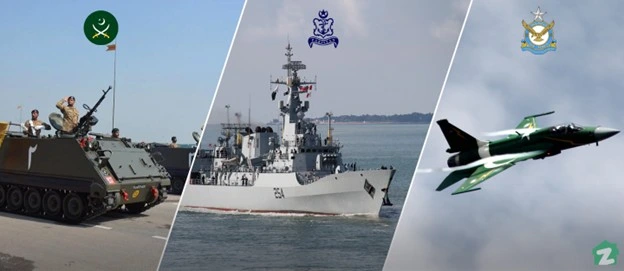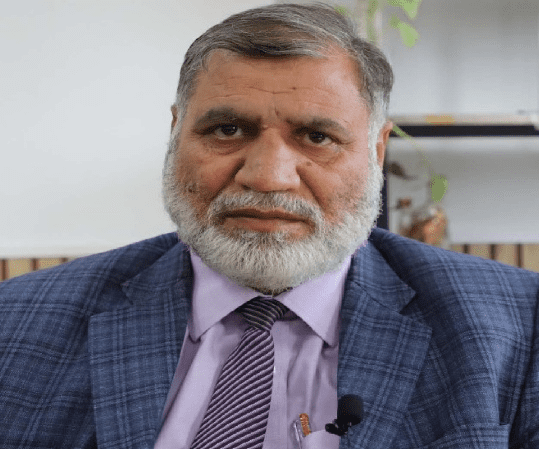Pakistan’s defense budget for the fiscal year 2025-26 has seen a substantial increase of Rs 2.55 trillion, marking a 20% rise compared to previous years. This increase comes at a time when the regional security landscape is becoming more precarious, especially with India’s growing military capability and the tensions that persist along the Line of Control (LoC). The decision to raise defense spending, despite Pakistan’s economic challenges, is a clear indication of the country’s commitment to securing its borders, maintaining regional stability, and ensuring deterrence against potential aggression.
Given the history of conflicts between the two nuclear-armed nations, this budgetary increase is not merely a reflection of military spending, but a response to the urgent need for a robust defense infrastructure. Pakistan’s strategic posture is shaped by its historical rivalry with India, whose military expansion poses a direct threat to the security and sovereignty of Pakistan. This substantial rise in the defense budget underlines Pakistan’s resolve to maintain its territorial integrity and readiness against external threats.
The 20% rise is driven by growing regional security concerns, particularly India’s military expansion and tensions along the Line of Control (LoC). Despite economic challenges, this increase reflects Pakistan’s commitment to safeguarding its borders, ensuring regional stability, and maintaining deterrence against potential aggression. The rise in defense spending is a direct response to the long-standing rivalry with India, emphasizing the need for a robust defense infrastructure to protect Pakistan’s sovereignty and readiness to counter external threats.
Regional Security Dynamics: The Need for a Stronger Defense
Pakistan’s defense budget is primarily driven by the perceived existential threat posed by India. The historical context of unresolved issues, such as the Kashmir dispute, frequent border skirmishes, and a history of wars in 1947, 1965, 1971, and 1999, underscores the importance of maintaining a robust military stance. The decades-long rivalry between the two nations has resulted in numerous clashes, making it imperative for Pakistan to sustain a powerful defense mechanism.
In May 2025, Pakistan was directly engaged in a military conflict with India following a missile strike incident. The conflict, which lasted four days, was triggered by a false flag operation in Pahalgam. This escalated into missile, drone, and artillery exchanges between the two countries. Despite India’s overwhelming military advantage in terms of resources, Pakistan’s military demonstrated its strength and successfully defended its territory, reinforcing the importance of defense spending. The conflict reinforced Pakistan’s military doctrine, which emphasizes credible deterrence to avoid any escalation into full-scale war.
Nuclear Deterrence: The Ultimate Safeguard for Pakistan’s Sovereignty
One of the cornerstones of Pakistan’s defense strategy is the maintenance of a credible nuclear deterrence. With India’s military superiority in conventional forces, Pakistan’s nuclear triad, comprising land-based, air-based, and sea-based systems, remains a critical element in ensuring the country’s security. The nuclear deterrence acts as the ultimate safeguard against any conventional military actions by India, providing Pakistan with a measure of strategic parity despite the asymmetry in conventional forces.
Pakistan has invested heavily in developing and maintaining a credible nuclear arsenal, with missile systems such as Shaheen, Babur, and Ababeel being crucial components. These systems are designed to provide Pakistan with the capability to launch nuclear strikes from land, air, and sea, ensuring that no adversary can take the country’s sovereignty for granted. The role of nuclear deterrence has been further solidified through continuous investments in command-and-control infrastructure, missile defense systems, and warhead technology.
This strategy of nuclear deterrence is not just aimed at countering India’s military advantage but also serves as a stabilizing force in the region. By maintaining nuclear parity with India, Pakistan ensures that the possibility of full-scale war remains limited, as the threat of nuclear escalation acts as a powerful disincentive for aggression.
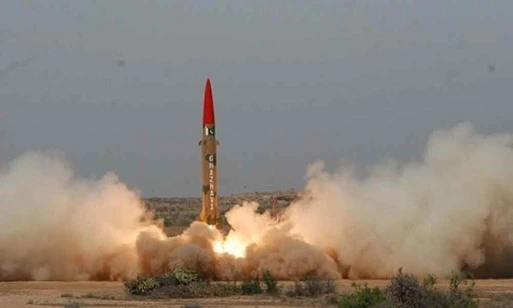
Internal Security and the Role of Military in Counter-Terrorism
Apart from external threats, Pakistan is also faced with significant internal security challenges. The country has been plagued by terrorism, militancy, and insurgency, particularly in regions like Khyber Pakhtunkhwa, Balochistan, and parts of Sindh. Militants, such as the Tehreek-e-Taliban Pakistan (TTP) and Baloch separatist groups, have posed substantial challenges to the stability of the country, necessitating a robust military response.
The increased defense budget for 2025-26 has been partly allocated to counter-terrorism operations, training, and the procurement of equipment necessary to fight internal threats. The Pakistan Army has been actively engaged in counter-insurgency operations, with success in eliminating high-value targets and restoring order to previously volatile areas. The presence of military personnel in these regions has been a crucial factor in maintaining peace and preventing further escalation of violence.
Moreover, the military’s role extends beyond combat operations to include peacekeeping and stabilization efforts. The training and equipping of local law enforcement agencies, intelligence-gathering operations, and the rehabilitation of insurgency-affected areas are integral parts of Pakistan’s internal security strategy.
The Quranic Perspective on Defense and Preparation
Pakistan’s defense strategy is also deeply rooted in Islamic teachings, which emphasize the duty of Muslims to be prepared for defense. The Quran offers clear guidance on the importance of preparedness for defense in the face of aggression. One of the most frequently cited verses in this context is Surah Al-Anfal (8:60), which commands Muslims to “prepare against them whatever you are able of power.” The term “power” (quwwah) used in this verse is interpreted broadly by Islamic scholars to include all forms of strength necessary for defense, ranging from physical strength and military training to modern military technology.
This religious obligation (fard kifayah) for Muslims is a communal duty, requiring the support of every citizen and taxpayer to ensure that the country is adequately prepared to defend itself. The teachings of the Prophet Muhammad (PBUH) emphasize the need for readiness, highlighting the importance of having strong armed forces to protect the Muslim community. The preparation for defense, is a vital part of the Islamic worldview, which sees defense as not just a political or military necessity, but a religious duty.


The interpretation of these verses is clear that Muslims are called upon to prepare all forms of strength for the defense of their motherland. The idea of deterrence is also present in this verse, as the purpose of such preparation is to terrify and prevent aggression. Moreover, the verses assure believers that their efforts will be rewarded, highlighting the importance of preparing for defense as a legitimate and noble cause in the eyes of Allah.
Modernizing the Military: Pakistan’s Investment in Technology
As part of the increased defense budget, Pakistan has placed a significant focus on modernizing its military capabilities. The aim is not just to expand the size of the armed forces but to ensure that they are equipped with the most advanced technology available. This includes enhancing air force capabilities, upgrading missile defense systems, and modernizing naval assets.
Pakistan’s military modernization program is designed to ensure that the country can respond to the evolving nature of warfare, including hybrid and conventional threats. The Air Force, for example, is receiving an allocation of Rs 520.75 billion (20.4% of the defense budget) for air superiority programs, which will enhance the country’s ability to control the skies in the face of India’s larger air force fleet. Similarly, the Navy is focusing on modernizing its fleet, with an allocation of Rs 265.97 billion, to enhance its readiness and safeguard Pakistan’s extensive coastline.
Furthermore, the military is investing in cyber defense capabilities to protect against the growing threat of cyber warfare. This includes the development of advanced cyber security infrastructure, training personnel in cyber warfare tactics, and securing critical infrastructure, such as government networks and defense installations.
The Role of Defense in National and Economic Security
The defense sector is not only responsible for protecting Pakistan’s borders, but also plays a key role in safeguarding the country’s economic interests. Strategic infrastructure, such as the China-Pakistan Economic Corridor (CPEC), ports, dams, and energy assets, are essential for the country’s development and require protection from both external and internal threats. Pakistan’s military is tasked with ensuring the security of these vital assets, which are crucial for the country’s economic growth.
Moreover, the military’s involvement in economic security extends to the protection of trade routes, particularly those in the Arabian Sea. The maritime security of the region, including the protection of shipping lanes, is vital for Pakistan’s economic stability, and the Navy’s modernization program aims to strengthen this capability.
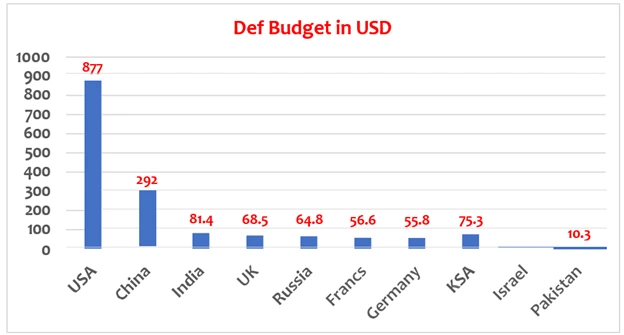
Deterrence as a Cost-Effective Strategy
One of the core arguments for Pakistan’s increased defense spending is the idea that deterrence is far cheaper than war. The cost of military conflict is not just measured in terms of financial expenditures, but also in human lives, infrastructure destruction, and regional instability. By maintaining a strong defense posture, Pakistan is able to prevent conflict and deter aggression, thus ensuring long-term peace and stability in the region.
Pakistan’s defense budget reflects this commitment to deterrence. Despite facing economic pressures, the country has prioritized military preparedness, understanding that a strong military presence can prevent escalation and reduce the likelihood of war. This strategy of deterrence is considered more cost-effective than the devastation of conflict, reinforcing the importance of maintaining a credible defense capability.
Pakistan’s defense budget reflects this strategy of deterrence. Despite ongoing economic challenges, the country has recognized the importance of a well-equipped and capable military to ensure national security. A strong military presence acts as a deterrent, making it less likely for adversaries to initiate hostilities. This approach, which emphasizes the prevention of conflict rather than reacting to it, is seen as a more sustainable and cost-effective solution in comparison to the high costs associated with full-scale warfare.
The strategic goal behind this defense budget increase is not only to ensure the country’s security, but also to maintain stability in the region. Pakistan understands that a credible defense capability can discourage potential aggressors from engaging in military action, thus promoting peace. This proactive defense strategy is a critical element of Pakistan’s national security policy, reinforcing the idea that investing in deterrence today can prevent the far greater costs of war in the future. The overall focus on deterrence demonstrates Pakistan’s commitment to peace through strength and its prioritization of military preparedness as a vital tool for regional stability.
A Strategic Investment in National Security
Pakistan’s defense budget for 2025-26 is a necessary investment in the country’s national security and regional stability. The increase in military spending is not just a response to external threats, but a proactive measure to ensure the protection of Pakistan’s sovereignty and territorial integrity. The country’s commitment to defense is also rooted in Islamic principles, which emphasize the duty of Muslims to be prepared for defense and to ensure the security of their community.
Pakistan’s defense budget reflects a strategic commitment to national security, ensuring that the country remains strong, vigilant, and prepared to face any challenges in the future. By balancing military strength with faith in Allah, Pakistan continues to uphold its duty of defense, as outlined in Islamic teachings, while ensuring the safety and security of its citizens.
Rooted in Islamic principles, the defense strategy emphasizes the duty of Muslims to be prepared for defense and protect their community. Despite economic difficulties, the government recognizes defense as essential for the nation’s long-term security. The investment in military modernization and internal security underlines Pakistan’s commitment to protecting its borders and ensuring peace in an unstable region, balancing military strength with faith in Allah.
Pakistan’s Strategic Decision to Prioritize Defense: A Proactive Approach to National Security
The decision to raise defense spending is not a reactionary move to external threats but a proactive and strategic measure to ensure the long-term stability of Pakistan in a region fraught with tension, particularly with neighboring India. The budget increase, though substantial, reflects a thoughtful and deliberate approach to the country’s security needs. The rise in defense spending is a direct response to the evolving security dynamics in South Asia, where the geopolitical climate remains volatile.
Pakistan has long faced the challenge of dealing with India’s military expansion and the unresolved Kashmir dispute. These issues, combined with the long history of border skirmishes and full-scale wars, underscore the need for Pakistan to maintain a robust defense posture. In addition to regional conflicts, Pakistan also faces the threat of insurgency, terrorism, and extremism within its own borders. These internal challenges further complicate the security environment and underscore the importance of investing in military strength.
The defense budget for 2025-26 is a comprehensive approach that covers multiple facets of Pakistan’s security strategy. This includes investments in military modernization, counter-insurgency operations, border security, and deterrence capabilities. Pakistan’s defense policy is shaped by the understanding that peace can only be achieved through strength and preparedness. The country’s military is central to ensuring its sovereignty and territorial integrity, and this budget reflects a continued commitment to maintaining a well-equipped and capable military force. Pakistan’s military strength is not only necessary for responding to external threats but also for managing internal security challenges, ensuring a stable environment conducive to national growth.
| Serial | Category | Pakistan | India | Comparison / Notes |
| 1 | Defense Budget (2025) |
$9.18 Bn | $80+ Bn | India spends 9 times more |
| 2 | Defense Budget (% of GDP) |
1.97% | 2.30% | |
| 3 | Total Armed Forces Personnel |
1.7 Mn | 5.1 Mn | India has 3 times more personnel |
| 4 | Military Aircraft | 1,399 | 2,229 | India has 60% more |
| 5 | Combat Tanks | 1,839 | 3,151 | India has 71% more |
| 6 | Naval Assets | 121 | 293 | India has 2.4 times naval capacity |
| 7 | Nuclear Warheads (Estimate) |
165 | 160 | Near parity |
| 8 | Global Firepower Rank |
12th | 4th | Major power gap |
| 9 | Defense Budget Growth (2025) |
0.2 | 0.095 | |
| 10 | Defense Spending per Capita |
$38 | $56 |
Note: India’s defense budget dwarfs Pakistan’s by over eight times, reflecting strategic ambitions. Despite this, Pakistan emphasizes efficiency and strategic use of its comparatively smaller budget to maintain defense readiness.
Defense Budget and Islamic Principles: A Sacred Duty to Protect and Serve
One of the unique aspects of Pakistan’s defense spending strategy is its alignment with Islamic principles, which emphasize the duty of Muslims to protect their community and maintain readiness for defense. Islam has always underscored the importance of preparation for defense as a communal obligation (fard kifayah) for Muslims, and Pakistan, as a Muslim-majority nation, bases its defense strategy on these teachings. The Quran explicitly calls on believers to prepare themselves for defense in the face of aggression, ensuring that they have the means to protect their lands, lives, and community.
Surah Al-Anfal (8:60) provides a direct mandate for Muslims to prepare all forms of strength for defense. The verse states: “And prepare against them whatever you are able of power and of steeds of war by which you may terrify the enemy of Allah and your enemy…” This commandment is interpreted by Islamic scholars to mean that all forms of strength—whether physical, technological, or organizational, are necessary for defense. This includes the development of modern military technologies, strategic defense capabilities, and ensuring the readiness of the armed forces. The duty to defend is not limited to soldiers alone but extends to all members of the Muslim community who must support the defense effort, whether through providing resources, logistical support, or contributing financially.
This concept of preparation is deeply ingrained in Pakistan’s military philosophy, and it guides the country’s approach to defense spending. By allocating substantial resources to military modernization, Pakistan is fulfilling this religious obligation to protect its citizens and uphold justice in the face of external and internal threats. The increased defense budget aligns with the teachings of Islam, reinforcing the idea that the defense of the nation is not only a national priority but also a religious duty. In this way, Pakistan’s defense budget serves as a means of ensuring that the country remains prepared for any form of aggression, thus upholding the values of justice, peace, and security as outlined in Islamic teachings.

Balancing Military Strength and Economic Challenges
While defense remains a top priority for Pakistan, the country also faces significant economic challenges. Pakistan’s economy is under strain due to low tax revenues, inflation, unemployment, and a growing fiscal deficit. Despite these challenges, defense spending continues to be prioritized because of its importance in ensuring the long-term security of the nation. The government of Pakistan understands that while economic difficulties can be addressed in the long run, the country’s security cannot be compromised.
In a region where tensions are high, particularly with India, the need for military readiness is critical. Pakistan’s defense budget increase is not just a response to the current security environment, but also a strategic investment for the future. The government recognizes that maintaining a capable and modern military force is essential for national security and for maintaining peace in a volatile region. The increase in defense spending reflects a forward-looking approach, one that ensures Pakistan is equipped to handle both internal and external threats.
While the government has to balance defense spending with other economic priorities, such as healthcare, education, and infrastructure, the importance of a strong defense is paramount. The investment in military modernization, internal security, and deterrence capabilities demonstrates Pakistan’s resolve to protect its borders, citizens, and national interests. This approach is seen as necessary for securing Pakistan’s future, both in terms of defense and long-term economic growth.
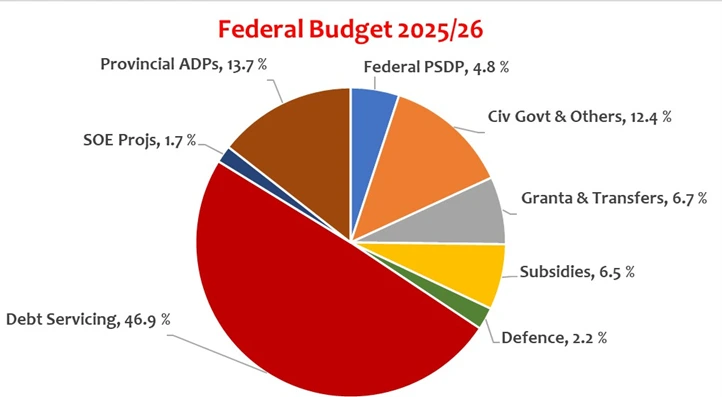
A Long-Term Strategy for Peace and Stability
Pakistan’s defense budget for 2025-26 represents a long-term strategy for ensuring peace and stability in the region. The government of Pakistan understands that the path to peace is not solely through diplomatic means but also requires military strength as a deterrent against potential aggression. The country’s investment in defense is a recognition that peace must be preserved through strength and preparedness.
This strategy of deterrence is viewed as more cost-effective than the alternative—war. War comes with not only financial costs but also the loss of human lives, destruction of infrastructure, and long-term regional instability. By maintaining a strong defense posture, Pakistan can prevent conflicts from escalating and deter potential adversaries from initiating hostilities. The military’s role in safeguarding the country’s security extends beyond merely responding to threats; it involves maintaining an environment where peace can be preserved and stability ensured.
Pakistan’s defense budget for 2025-26 reflects a strategic, proactive, and long-term approach to national security. Rooted in Islamic principles and driven by the need to safeguard the country’s sovereignty, the defense budget is an essential investment in ensuring the protection of Pakistan’s borders and maintaining peace in a turbulent region. Despite economic challenges, Pakistan remains committed to its duty of defense, balancing military strength with faith in Allah, and ensuring that the country is prepared to face any challenges in the future. The defense budget serves not only as a tool for military readiness but as a symbol of Pakistan’s commitment to its citizens, its faith, and its long-term security.
Conclusion
This rise in military spending comes at a time when Pakistan is directly addressing escalating security threats, especially after the armed conflict with India in May 2025. This conflict highlighted the need for a strong military to defend Pakistan’s sovereignty, making defense spending an essential priority. India’s increasing military budget, which grew by 9.5%, has further exacerbated the strategic imbalance between the two nations, prompting Pakistan to increase its defense resources to ensure adequate deterrence and maintain its military readiness.
Despite significant economic challenges, Pakistan has committed 1.97% of its GDP to defense, nearly matching India’s 2.3%. This reflects Pakistan’s resolve to prioritize military strength while optimizing its defense budget. Although India’s defense budget far exceeds Pakistan’s, Pakistan’s approach focuses on efficiency and effectiveness rather than sheer size. With a defense spending of $38 per capita compared to India’s $56, Pakistan’s strategy emphasizes maintaining near-nuclear parity and ensuring that its military capabilities are effective without engaging in an arms race. By investing in military modernization and deterrence, Pakistan aims to strengthen its defense while avoiding unnecessary escalation.
The defense budget also reflects Pakistan’s strategy of deterrence, a cost-effective alternative to war. Deterrence ensures that Pakistan remains prepared for potential conflicts without resorting to costly military actions. With a smaller armed forces size (1.7 million personnel versus India’s 5.1 million), Pakistan maintains a lean but capable military force ready for hybrid and conventional warfare. The Air Force has been allocated Rs 520.75 billion (20.4% of the defense budget) to support air superiority programs, countering India’s fleet of 2,229 aircraft. Similarly, the Pakistan Navy’s Rs 265.97 billion allocation focuses on enhancing maritime readiness along the 1,046 km coastline, despite India’s much larger naval fleet of 293 assets.
In addition to external defense, the budget prioritizes internal security, particularly in regions like Khyber Pakhtunkhwa (KP) and Balochistan, where ongoing insurgencies and terrorism necessitate a strong military presence. Pakistan’s military is tasked with countering internal threats, and the increased defense budget is crucial to ensuring stability in these areas.
Conclusively, the increased defense budget reflects Pakistan’s strategic commitment to national security, balancing military readiness with deterrence, modernization, and internal stability. This dual focus on both external and internal security demonstrates the comprehensive nature of Pakistan’s defense strategy. By focusing on cost-effective strategies, Pakistan ensures its military is capable of defending the country while prioritizing peace and avoiding the destructive consequences of war.

